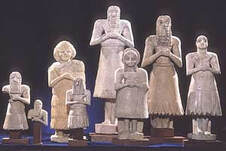weekly column
|
Each week, find a commentary on something connected to verses of Torah or another source of wisdom
|
|
Each week, find a commentary on something connected to verses of Torah or another source of wisdom
|
 The Numbers:13 Project His offering: one silver bowl weighing 130 shekels and one silver basin of 70 shekels by the sanctuary weight, both filled with choice flour with oil mixed in, for a meal offering; Numbers 7:13 Over the course of our forty-plus years of welcoming guests into our home, my wife and I have been the recipients of many tokens of appreciation. I was taught to call them “hostess gifts,” though I am certain that nomenclature is outdated. The custom, however, has continued, and one of the ways you can tell if someone was raised to be familiar with social graces is if there is a small gift in hand upon arrival as a guest. Frequently, a bottle of wine or a small arrangement of flowers suffices. But just as often, the creativity of the gift is most impressive. It needn’t be expensive; we have received unusual spices, a salt cellar, candles, a decorated cork for a bottle, coasters and small packages of dried fruit. Some people have put great thought into finding something they think will appeal to our Jewish values. Some have contributed to what they know are our interests and hobbies. A few have honored us with something home-made. Occasionally there is an exotic liqueur. Likewise, we have tried to imagine what our hosts would appreciate. An interesting spoon, a small picture frame, a refrigerator magnet that is either not tacky (hard to find) or uber-tacky (harder to find), assorted teas – these are items that tell our hosts how much we appreciate the thought that went into the invitation, and that it was reciprocated. I do not know where this custom originated, but I like to imagine it goes deep into history. I once visited an exhibit at the Bible Lands Museum in Jerusalem that seemed to me to be a collection of rows and rows of idols, lined up as if they were warehoused for future sale. The first thing that came to my mind was the story of Abraham’s father, Terach, who was an idol merchant. But the guide told me my assumptions were all wrong. The tableau was indeed a pagan temple, but the figures were not the idols. They were the worshipers. This particular sect believed that the more hours spent in praising and appeasing the local gods, the more likely that blessings would rain down on them. But people have to tend to the fields, raise families, address the necessities of life. To make it possible to meet a level of piety and live a day-to-day life, people commissioned statues of themselves and placed them in the temple as “permanent residents.” They were therefore always present in “body” and spirit. There were many jokes made at the expense of that custom and modern-day habits of attending worship. But kidding aside, there was something profound about the custom. Members of this community could live perpetually in the presence of the divine by gifting themselves to the temple. When we have overnight guests, they almost always say, upon leaving, “I hope I didn’t leave anything behind.” And I usually respond, “If you did, it just means you want to come back again.” Leaving something of yourself with a host or hostess makes you a “permanent resident” of their home. Without overstaying your welcome or interfering with your need to get back to your life, you can leave a piece of yourself as a token of your bond of friendship or love. In my imagination at least, the origin of the hostess gift – and especially choosing a gift that is a reminder of the one who gives it – is not only an expression of appreciation, but also of connection. Without being intrusive, the guest will always find something of herself or himself in a home that has been welcoming. Those gifts that were brought to the tabernacle performed the same function. Graven images of self were no more acceptable than those of God. But a lovely silver bowl, some fine oil, other objects and foods that would sustain the tabernacle and its attendants were gifts of appreciation that also gave the donor and his tribe a sense of being “permanent residents,” a part of them always present in the holy precincts of God’s dwelling place among the people. Anyone entering would recognize a part of themselves and feel at home. Can the same effect be accomplished with a bottle of wine or a small picture frame? Maybe, maybe not. But the heartfelt offering of a guest will long be remembered by the host, and the gracious acceptance by the host will lone be remembered by the guest. And that’s close enough for me.
0 Comments
Leave a Reply. |
Archives
October 2023
Categories |